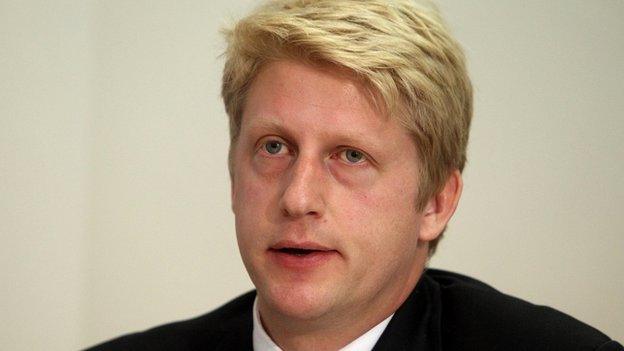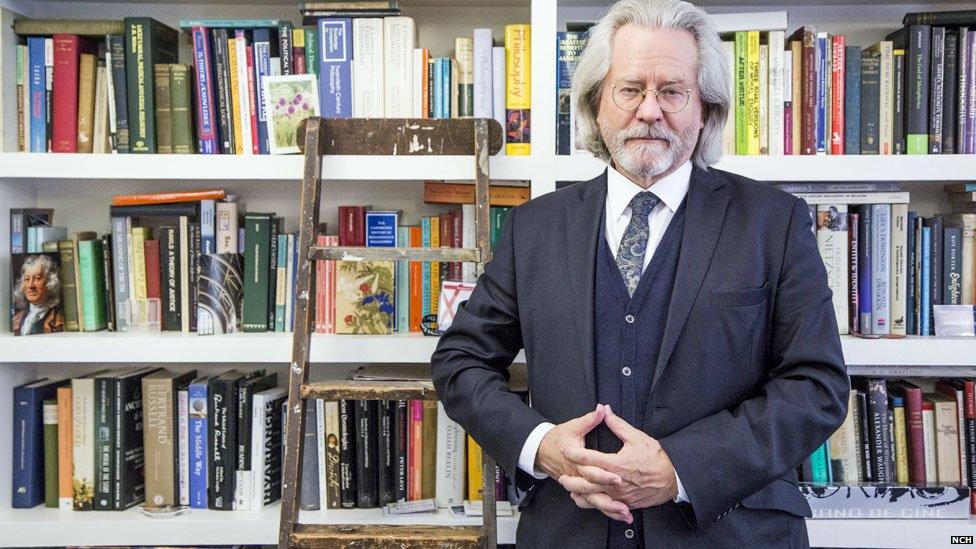University fees linked to teaching quality
- Published

There will be a new independent Office for Students to represent their interests
Universities in England will be able to raise tuition fees with inflation if they can demonstrate high quality in teaching, Universities Minister Jo Johnson has proposed.
The minister has given further details of financial incentives for universities to improve teaching.
The higher education reforms also propose a new Office for Students, to ensure value for money for students.
Labour's Gordon Marsden said the plans were a "Trojan Horse for raising fees".
Mr Johnson said he wanted to ensure "the time and money students invest in higher education is well spent".
The government's consultation paper on higher education is proposing:
improving the standard of teaching and linking it to fees
an Office for Students as a student "champion"
easier-to-open new universities
targets to recruit more disadvantaged and ethnic minority students
degrees with point scores as well as grades
The plan to allow universities to increase tuition fees with inflation, above the £9,000 limit, for those with "high quality teaching" was announced in July in Chancellor George Osborne's Budget speech.
During the autumn, Mr Johnson told university leaders that this would be an incentive to improve teaching standards, which had become the "poor cousin" to research.
The green paper suggests universities could be ranked into three or four groups, based on teaching quality, student experience, graduate job prospects and drop-out rates.
Each group would be able to raise their fees slightly at different levels within an overall cap of the rate of inflation. Those below the lowest level would risk losing some fee income, while those ranked most highly would be able to charge the most.
Labour's university spokesman Gordon Marsden said this would create a "two-tier system".
"That could brand some universities as second class, and damage the life chances of students who go to them," he said.
National Union of Students president Megan Dunn said it was "reassuring to see the government putting access to education at the heart of their proposals".
But she said the students' union was "adamant that the Teaching Excellence Framework should not be linked to an increase in fees".

Jo Johnson says for the first time the higher education regulator will prioritise students
The UCU lecturers' union has warned that the way of measuring teaching standards must be carefully considered, or else "manipulation of statistics may be the name of the game, rather than bolstering the student experience".
An Office for Students, which will merge the Higher Education Funding Council for England and the Office for Fair Access, has been proposed as a way of increasing the student consumer voice.
"For the first time, the main higher education regulator will have a duty to promote the student interest when making decisions and will be responsible for ensuring value for money for students and taxpayers," said Mr Johnson.
This week saw student protests against the cost of tuition fees, and the proposals from the government include targets to protect and increase access for poorer students and those from ethnic minorities.
Open access
Mr Johnson wants to double the proportion of students from disadvantaged backgrounds and to have 20% more ethnic minority students across higher education by 2020.

Students protested this week about the cost of going to university
The minister said this would not be about quotas for individual institutions or giving individual students easier access, but would be about encouraging much more transparency in the applications process, and the new Office for Students would have powers to require universities to release data.
There will also be a move to make it easier to open new universities and to gain degree-awarding powers.
There have been complaints that the current system is a "closed shop" and new providers have been unable to offer more options for students.
AC Grayling, head of the New College of the Humanities in London, which could be a beneficiary of opening up the system, said if the proposals "result in really workable opportunities for new entrants while preserving the high quality of university provision... it will be a great boon to the sector and the country".
The proposals also require more protection for students if their university or college shuts down, such as a contingency plan for students to continue elsewhere and financial compensation.
Degree points and grades
The proposals for monitoring the quality of teaching will also be used to push universities towards using points scores - a "grade point average" - as well as the traditional degree classifications.
Mr Johnson said: "We want to encourage a system which provides greater information to employers about where attainment really lies. It needs to sit alongside, rather than replace, the honours degree classification, so that people don't lose that continuity of information.
"But there is a very big band, the 2:1 band. It disguises very considerable differences in attainment. You can be at the top of the band and then be 50 percentage points below and still be getting a 2:1.
"And students who worked hard should be able to signal to employers that's what they've achieved."
Dame Julia Goodfellow, president of Universities UK and vice-chancellor of the University of Kent, said the plan for better teaching must ensure it is not "an additional burden for those teaching in our universities and that it provides useful information for students, parents, and employers".
"Universities are already improving the amount of information to students about courses to ensure that their experience matches their expectations," she said.
- Published6 November 2015
- Published8 July 2015

- Published9 September 2015

- Published28 May 2015

- Published27 October 2015
